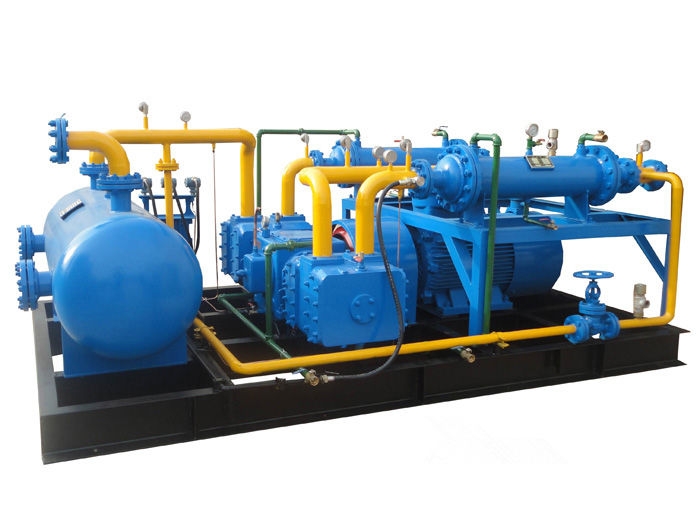The Syngas Compressor: Essential to the Effectiveness of the Gasification Process
What does a Syngas compressor mean?
- A type of compressor made exclusively for compressing syngas is known as a syngas compressor. Synthesis gas, often known as syngas, refers to a combination of hydrogen (H2) and carbon monoxide (CO), typically created by gasifying or steam-reforming carbonaceous sources like coal, biomass, or natural gas. In many syngas-using processes, such as gasification, methanol production, and other chemical synthesis applications, the syngas compressor is an essential component. Its main job is to raise the syngas pressure to the required level, which helps with storage or subsequent procedures.
- Depending on the application and process requirements, reciprocating compressors are frequently used to compress syngas. They must be constructed to manage syngas’ special properties, including their high reactivity, possible impurities, and changeable composition. As syngas manufacturing methods frequently require elevated circumstances, they also need to be able to operate under high temperatures and pressures. The flow rate, target pressure ratio, gas composition, temperature, and operating limitations all play a role in the choice and design of a compressor. These compressors are generally built to withstand the demanding requirements of syngas applications while assuring dependable and efficient operation.
Powering the Future of Energy Production with a Syngas Compressor:
In the context of syngas-based operations, syngas compression is particularly important for the future of energy generation. Syngas, also known as synthesis gas, combines hydrogen (H2) and carbon monoxide (CO) that may be created from several different feedstocks, such as coal, natural gas, biomass, or even waste products. It is a stretchy energy source that may be practical for a widespread variety of tasks, including producing electricity, chemical synthesis, and fuel for vehicles.
Syngas must be compressed to greater pressures for effective storage, transit, and use to be properly used as an energy source. Syngas compressor is made especially for handling syngas’ special qualities, such as its corrosiveness and changeable composition. Depending on the application’s particular needs, these compressors is normally either reciprocating in design. Here are several crucial syngas compression factors and their importance for upcoming energy production:
- Enhanced Energy Efficiency:
The efficient conveyance and storage of energy is made possible by syngas compression. Syngas can store or transmit more energy over longer distances when compressed to higher pressures because of the increase in volumetric energy density. This is crucial for operations like distributed power generation or industrial ones where syngas must be transferred from the point of production to the place of consumption.
- Integration with Gasification Processes:
Gasification is a process that transforms carbonaceous feedstocks into syngas by reacting them with a regulated amount of oxygen or steam. Syngas is frequently generated by gasification. To ensure the effective functioning and downstream use of syngas, syngas compressors are a crucial component of gasification systems. The gasifier may maintain ideal operating conditions and boost overall process effectiveness by compressing the syngas.

- Power Generation:
Syngas is a fuel that may be used in gas turbines or combined cycle power plants to generate electricity. It is ensured that syngas satisfies the demands of the power generation machinery by compressing it to the necessary pressure levels. With the aid of syngas compressors, systems based on syngas may generate electricity with consistency and efficiency.
- Chemical Synthesis:
Syngas is used as a feedstock to create various chemicals, such as synthetic natural gas, methanol, and ammonia. For these chemical synthesis processes to continue at the required pressures and flow rates, syngas compressors are essential. They ensure the syngas combines with catalysts effectively, resulting in good product yields and process efficiency.
- Carbon Capture and Utilization:
Syngas compression is an important component of carbon capture and utilization techniques. Carbon-neutral or even carbon-negative fuels can be created by absorbing CO2 emissions from industrial operations or power plants and mixing them with hydrogen from syngas. The resultant syngas-CO2 combination must be handled by syngas compressors to be compressed and used as a clean energy source.
A Crucial Part of the Gasification Process Efficiency Is the Syngas Compressor:
The syngas compressor is essential for the gasification process to be more effective. Carbonaceous feedstocks are changed into a syngas combination by the thermochemical process of gasification. Hydrogen, carbon dioxide, carbon monoxide, and other impurities comprise most syngas. At relatively low pressures during the gasification process, syngas is created. However, the syngas must be compressed to greater pressures for many downstream uses, including gas-to-liquid operations, chemical synthesis, and power generation. The primary purpose of the compressor is to boost the syngas pressure to the required amount. Compressing the syngas has the following advantages:
- Enhanced Efficiency:
Compressing the syngas enables more effective subsequent procedures. Higher-pressure syngas may be used effectively in gas turbines or other power-generating systems, increasing the gasification plant’s efficiency.
- Improved Syngas Quality:
Compression aids in the removal of pollutants that may be present in the syngas, such as trace levels of particles, sulphur compounds, and other contaminants. This raises the syngas’ overall quality and qualifies it for various uses.
- Better Process Management:
Compressors make it possible to manage the gasification process more effectively. The pressure and flow rate of the syngas may be controlled by altering the compressor operation, enabling the gasification plant to operate at its best and maintain stability.
- Facilitates Gas Cleanup:
Before use, syngas may undergo extra treatment stages in some gasification processes to eliminate contaminants. Compressing the syngas can aid in these gas cleanup activities by providing the appropriate pressure for efficient separation and purification.
Conclusion:
Our compressors, which offer a more effective way to transport and store fuel, are revolutionizing the energy sector. Syngas combines hydrogen and carbon monoxide, and a syngas compressor is a reciprocating compressor used to compress and store syngas. We are committed to meeting the demands of our clients. HUAYAN may create goods based on the client’s specifications and then produce and install them.
